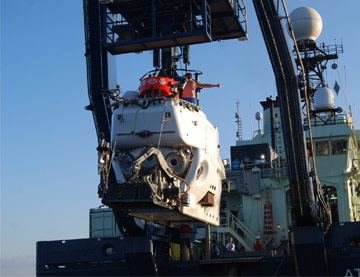-

 Benthic Ecology and BiogeochemistryResearch Group
Benthic Ecology and BiogeochemistryResearch Group
The research being undertaken in the group spans a number of topics, including assessing the impacts of deep-sea mining on seafloor and pelagic ecosystems, understanding the impact of climate change on deep-sea and polar seafloor ecosystems, quantifying the importance of organic-falls (kelp, wood, jellyfish) in biological C-cycles and structuring deep-sea communities, and exploring biogeochemical cycling in deep-sea sediments. In addition, the group also undertakes research in shallow-marine habitats looking at the importance of mangroves in coastal environments, and how fish farming and mine tailings impact coastal marine habitats.
The group maintains the most advanced deep-sea lander facility in the UK, which includes respirometer landers (one 6km and two 12km rated systems), baited-camera landers with video and digital stills capabilities (6km rated), baited-trap systems (12km rated), seafloor landers with sediment traps (5km and 6km rated), and deep-sea ROV-operated aquatic eddy covariance landers (4km rated) to measure seafloor fluxes over large surface areas (100 square meter) on hard and soft substrates. The team also routinely use ROV, AUV and manned submersibles to undertake their research. Please see the on-going project page for a list of the research programs the group are currently leading.
